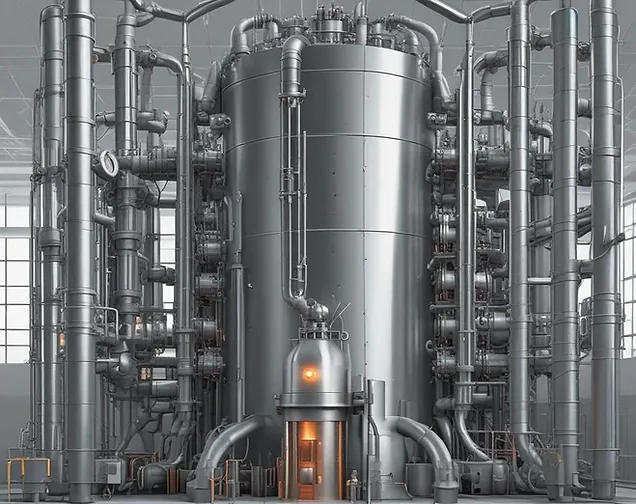Harnessing the power of rocket fuel
In a world full of energy that never sleeps
In an ever-evolving world driven by relentless energy demands, the quest for solutions that tap into a diverse array of power sources, from traditional to cutting-edge, has never been more urgent. Enter Porritt Inc., where we specialize in revolutionizing existing energy grid platforms. Our mission? To lead the charge in pioneering innovative methods for storing solar energy, leveraging its abundant availability and unlocking its full potential.
While solar farms bask in the sun’s rays, producing ample free energy during the day, they often lie dormant after sunset, presenting a challenge for conventional large-scale battery storage systems. But at Porritt Inc., we thrive on challenges. Our groundbreaking solution? Harnessing the power of PEM Electrolysis to produce and store elemental hydrogen using surplus solar-generated electricity.

By capturing excess energy during daylight hours and converting it into hydrogen, we empower facilities to power through the night without skipping a beat. At Porritt Inc., we don’t just see problems; we see opportunities for innovation. Our proactive approach and unwavering commitment to pushing boundaries drive us to explore new frontiers in energy storage, ensuring a brighter, more sustainable future for generations to come. Join us on our journey as we redefine the possibilities of renewable energy.
Hydrogen is the bridge between our past reliance on fossil fuels and the future of clean, renewable energy. As we navigate the transition towards a more sustainable energy landscape, hydrogen emerges as a versatile and promising solution to address both our immediate needs and long-term goals.
One of the key advantages of hydrogen is its versatility as an energy carrier. It can be produced from a variety of sources, including natural gas, biomass, and electrolysis of water using renewable electricity. This flexibility allows hydrogen to serve as a bridge between our existing fossil fuel infrastructure and the emerging renewable energy sources of the future.

In the short term, hydrogen can play a crucial role in decarbonizing our power grid by serving as a clean alternative to traditional fossil fuels. By utilizing hydrogen in fuel cells to generate electricity, we can reduce greenhouse gas emissions and air pollution associated with conventional power generation methods such as coal and natural gas. This not only helps to mitigate the impacts of climate change but also improves air quality and public health in communities around the world.
Furthermore, hydrogen can serve as a valuable energy storage medium, helping to address the intermittent nature of renewable energy sources such as solar and wind. By storing excess renewable energy in the form of hydrogen during times of low demand, we can ensure a reliable and resilient energy supply that can be dispatched when needed. This enhances the integration of renewables into the grid and helps to stabilize electricity prices, benefitting both consumers and utilities alike.
As we look to the future, hydrogen holds even greater promise as a catalyst for innovation and technological advancement in the energy sector. Emerging technologies such as green hydrogen production, which utilizes renewable energy sources like wind and solar to power electrolysis, offer the potential for truly sustainable hydrogen production with zero carbon emissions. This opens up new opportunities for expanding the use of hydrogen in sectors beyond power generation, including transportation, industry, and heating.
In transportation, hydrogen fuel cell vehicles offer a clean and efficient alternative to internal combustion engines, with the added benefit of fast refueling and long driving ranges. Similarly, hydrogen can be used as a feedstock for industrial processes such as steel and ammonia production, helping to decarbonize some of the most carbon-intensive sectors of the economy.
As we continue to develop ever newer forms of energy, such as advanced nuclear power, geothermal energy, and next-generation solar technologies, hydrogen will remain a crucial enabler of our transition to a low-carbon future. Its inherent flexibility and scalability make it well-suited to complement a diverse mix of renewable energy sources, providing a reliable and sustainable energy infrastructure for generations to come.
In conclusion, hydrogen represents a bridge between our past reliance on fossil fuels and the future of clean, renewable energy. Its versatility and potential to decarbonize multiple sectors of the economy make it a key player in the transition to a more sustainable energy system. By embracing hydrogen as a central pillar of our energy strategy, we can pave the way for a brighter and cleaner future for all.

Recycled Plastic Bottle Bricks
Welcome to the Future of Sustainable Home Building Recycled Plastic Bottle Bricks Introduction: In a…
Providing A Stable Power Grid
Providing A Stable Power Grid We implement total energy solutions including those that are good…
Changing the world forever
Changing the world forever Nuclear fusion stands at the precipice of revolutionizing the global energy…


